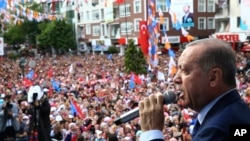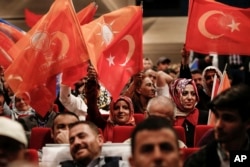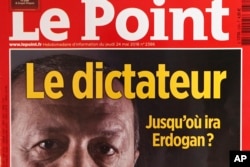Conspiracy theories have long been a feature of cultural and political life in Turkey and President Recep Tayyip Erdogan has been adept, say his political foes, in using them to stoke a long-held fear by Turks of the malevolence of foreign powers determined to "demolish" the country.
But in the run-up to the June 24 snap presidential and parliamentary elections, Erdogan and his aides seem more eager than ever, say his opponents, to paint Turkey as beset by shadowy outside forces and to blame foreign governments for all of Turkey’s woes.
Those include a calamitous slide in the value of the lira, which has lost 17 percent of its value against the dollar since the start of 2018.
Speaking to Turkey’s private broadcaster A Haber Wednesday, Foreign Minister Mevlut Cavusoglu blamed the plunge in the Turkish lira on an organized campaign masterminded abroad - including by Turkey’s NATO allies.
“They began working on how they could demolish Turkey through its economy after the July 15 coup attempt failed. We have managed to repel these attacks with minimum damage by taking precautions,” Cavusoglu said, referring to the failed overthrow attempt of 2016.
“Some countries are in this scheme, as well as financial institutions and the interest rate lobby. These include some Muslim countries, too. I will not name names here, I am only drawing the framework,” he added.
An organized foreign-based campaign to attack the lira isn’t seen as the cause for the crash in the value of Turkey’s currency by economists. European powers are more often than not cited by Erdogan and his followers as the main plotters. But economists say weakening the lira isn’t in European interests - quite the reverse in fact, given that the plummeting currency is threatening to spark a Europe-wide financial crisis because Italian, Spanish and French banks have lent billions to Turkish companies, which are now struggling to service their dollar-denominated loans.
“European banks are vulnerable to a worsening crisis in Turkey,” Charles Gave, a strategist at the independent analysis house GaveKal, has warned. “When it comes to major defaults in Turkey, it takes little imagination to predict new banking turmoil in Europe,” he added.
Economists point to Erdogan’s habit of interfering with the decisions of the country’s central bank, and his months-long refusal to allow interest rate hikes, which are unpopular with his supporters, for the perilous crash in the lira.
Keeping interest rates low for years fueled a business boom good for key supporters, and consolidating his support base is key, if Erdogan and his Justice and Development Party (AKP) are to win the elections. But the plummeting lira has prompted even some traditional AKP voters to question Erdogan’s handling of the economy, say analysts, although a recent poll suggests that 42 percent of Turks agree with Erdogan’s explanation for its fall.
It’s not just the economy
But it isn’t just the drop in the value of Turkey’s currency that is being blamed on plots hatched overseas by conspiratorial foreigners. As the election campaign has unfolded, the Turkish president and AKP stalwarts have painted in ever more vivid colors how the U.S., Europeans and the "Jewish lobby" are all aiming to wreck the Turkish state, argues Abdullah Bozkurt of the Stockholm Center for Freedom, an advocacy group founded by Turkish journalists in exile.
It is part of an “election strategy to suppress the talk of growing economic troubles, which is a major vulnerability for Erdogan during the election campaign” and to stir up nationalist emotions to draw attention “away from issues such as the deficit in democracy, human rights violations, the state of emergency, good governance, corruption and economic woes,” he says.
Amid signs that the AKP is struggling in the run-up to next month’s elections, Erdogan and his party stalwarts have been ratcheting up conspiracy theories and playing on fears about foreign powers and so-called fifth columnists, say analysts and his political rivals.
It is not a new AKP tactic. The failed July 2016 military coup, which Erdogan and his aides say was masterminded by a U.S.-based Turkish cleric, has also been "linked" by Erdogan to the CIA and other foreign intelligence agencies as well as Western research organizations.
A U.S. pastor, Andrew Brunson, is currently on trial, accused by Turkish authorities of being a spy and of conspiring with the outlawed Kurdistan Workers’ Party, or PKK, to carve out a Christian Kurdish mini-state in Turkey. Brunson says he never engaged in politics and analysts say the charges are implausible.
To some extent the AKP playbook in this election run-up is similar to the electoral tactics employed in 2015, according to analysts. But the difference this time, they say, is in intensity and degree with Erdogan and his ministers seemingly eager to pick as many fights with Western governments as they can and in the process to strain ties to breaking point.
‘Deliberately risking a confrontation’
“Erdogan is deliberately risking a confrontation with Turkey’s allies, friends and trading partners,” according to Bozkurt.
This week, Turkish officials launched a ferocious attack on French President Emmanuel Macron for his defense of French magazine Le Point, which splashed a photo of Erdogan on its May 24 edition dubbing him a “dictator.” Le Point editors said they had been targeted for harassment by Erdogan supporters, prompting Macron to condemn the intimidation as unacceptable. “You cannot put a price on freedom of the press, without it, it's dictatorship,” the French leader tweeted.
Turkey’s EU Affairs Minister Omer Celik slammed Macron. “French magazine Le Point circulated a hate crime and attacked our president with dark propaganda,” Celik tweeted. “How long have hate crimes been freedom of the press? Is it proper for Macron when the same style, hate speech and black propaganda are used against him?”
On a visit to London in mid-May, Erdogan focused his ire on U.S. President Donald Trump, baiting him and lambasting him during an event at Chatham House for moving the American embassy from Tel Aviv to Jerusalem and saying the United States had lost its mediating role in the Mideast. Other U.S. allies in the region have also disapproved of the U.S. embassy’s relocation, but have been more restrained in their criticism.
At times it has appeared as if AKP candidates are running against the West - not domestic opponents. In a campaign speech Thursday, AKP minister Veysel Eroglu promised supporters: “I swear to you we'll overtake Britain, Germany and France. We are on the rise and they are in decline. Allah is with Turkish nation. Therefore don't worry, we'll succeed on this with God's help.”
The increasing anti-Western rhetoric, rampant nationalism and conspiracy-spotting is seeping into what would normally be non-political areas. In recent weeks pro-government journalists have targeted Netflix, the movie-streaming company, claiming that the popular series Casa de Papel contains subliminal themes designed to foment “an economic coup d’etat, political assassinations, a wave of terror attacks.”
And Istanbul taxi drivers have accused Uber rivals of having ties to dark overseas powers.


